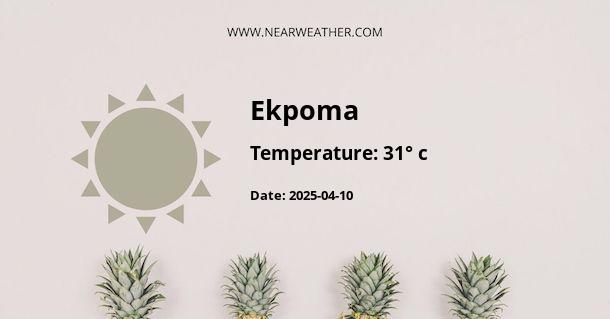Climate and Weather in Ekpoma, Nigeria
Ekpoma is a town located in the Esan West Local Government Area of Edo State, Nigeria. It is situated in the southern part of the country and experiences a tropical climate. The climate in Ekpoma is characterized by two distinct seasons - the wet season and the dry season.
Wet Season (April to October)
The wet season in Ekpoma typically starts in April and lasts until October. During this period, the town experiences heavy rainfall and high humidity levels. The average monthly rainfall ranges from 100mm to 300mm, with the highest rainfall occurring in June and July. These months are known for frequent thunderstorms and showers.
The wet season in Ekpoma is influenced by the movement of the Intertropical Convergence Zone (ITCZ), a weather system that brings moisture from the Atlantic Ocean. The ITCZ shifts northwards during the wet season, resulting in the rainy conditions experienced in Ekpoma and other parts of Nigeria.
The temperature during the wet season remains relatively high, with average daily temperatures ranging from 25°C to 30°C. The combination of high temperatures and humidity can make the weather feel quite uncomfortable, especially during the peak rainy months.
It is important to note that the wet season in Ekpoma can sometimes be characterized by periods of prolonged rainfall, which may lead to localized flooding. Residents and visitors are advised to take necessary precautions during this time.
Dry Season (November to March)
The dry season in Ekpoma begins in November and lasts until March. This period is characterized by a significant reduction in rainfall and lower humidity levels. The average monthly rainfall during the dry season ranges from 10mm to 50mm, with the lowest rainfall occurring in December and January.
The dry season in Ekpoma is influenced by the movement of the Harmattan winds, which blow from the Sahara Desert towards the Gulf of Guinea. These winds bring dry and dusty conditions to the region, resulting in reduced moisture and lower humidity levels.
The temperature during the dry season remains relatively high, with average daily temperatures ranging from 28°C to 34°C. The lack of rainfall during this time contributes to dry and hot conditions, making it important for residents and visitors to stay hydrated and protect themselves from the sun.
Annual Climate Overview
The climate in Ekpoma can be summarized as a tropical savanna climate. The town experiences high temperatures throughout the year, with average annual temperatures ranging from 25°C to 32°C. The hottest months are typically February and March, while the coolest months are usually December and January.
Here is a table summarizing the average monthly temperature and rainfall in Ekpoma:
| Month | Average Temperature (°C) | Average Rainfall (mm) |
|---|---|---|
| January | 28 | 15 |
| February | 30 | 20 |
| March | 31 | 30 |
| April | 30 | 100 |
| May | 29 | 150 |
| June | 28 | 250 |
| July | 27 | 300 |
| August | 27 | 250 |
| September | 27 | 150 |
| October | 28 | 100 |
| November | 29 | 30 |
| December | 28 | 15 |
Impact on Agriculture
The climate in Ekpoma has a significant impact on agriculture in the region. The wet season provides favorable conditions for the cultivation of crops such as maize, yam, and cassava. The high rainfall ensures an adequate water supply for irrigation and crop growth.
However, excessive rainfall during the wet season can also lead to challenges such as erosion and waterlogging, which can negatively affect crop yields. Farmers in Ekpoma employ various techniques to mitigate these risks, including the construction of drainage systems and the use of resistant crop varieties.
During the dry season, farmers in Ekpoma rely on irrigation systems to sustain crop growth. The reduced rainfall and dry conditions can pose challenges for agriculture, but with proper water management and irrigation practices, farmers are able to cultivate crops such as vegetables and fruits.
Conclusion
Ekpoma, Nigeria experiences a tropical savanna climate with distinct wet and dry seasons. The wet season, from April to October, is characterized by heavy rainfall and high humidity levels, while the dry season, from November to March, is marked by reduced rainfall and lower humidity levels. The climate in Ekpoma has a significant impact on agriculture in the region, with the wet season providing favorable conditions for crop cultivation and the dry season requiring irrigation systems. Understanding the climate and weather patterns in Ekpoma is essential for residents, visitors, and farmers to plan and adapt accordingly.
A - Ekpoma's Latitude is 6.742060 & Longitude is 6.139000.
A - Weather in Ekpoma is 31° today.
A - Climate Conditions in Ekpoma shows overcast clouds today.
A - Humidity in Ekpoma is 59% today.
A - Wind speed in Ekpoma is 7.85 km/h, flowing at 236° wind direction. today.
